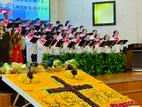Editor's note: Paul Yuan is a Chinese missionary currently serving in Australia for 19 years. He came to faith in China, pursued further studies overseas, and has since been engaged in campus ministry, primarily reaching university students and recent graduates. Initially focused on Chinese communities, his mission work has expanded across diverse cultural groups. In the past three years, he has increasingly devoted himself to outreach among Pacific Island nations. In this interview, Yuan shares how postmodern culture is shaping the way young people think and how the church can respond with clarity, community and the unchanging message of the gospel.
In a world shaped by postmodern thinking—where truth is relative, identity is fluid, and meaning is often questioned—how can Christians communicate a message that claims exclusivity and demands repentance?
Drawing on years of frontline experience, Paul Yuan reflects on the spiritual landscape shaped by postmodernism—examining how this cultural environment shapes young people's thinking, learning styles, and spiritual receptiveness, and how Christian educators and missionaries can adapt their approach without compromising the core of the gospel.
Clarifying the Message
"In Australia, the challenge we face isn't atheism," Paul stated. "It's postmodernism—a culture where everything is valid. There are hundreds of gods, hundreds of worldviews, and nothing is exclusive."
Young people today grow up immersed in this environment, overwhelmed by competing values. "They don't know what to choose. The gospel becomes just one message among many."
This context raises a vital question for missionaries and Christian leaders: What sets the Christian faith apart? In many theistic environments, not all belief systems are monotheistic, and even among those that are, such as Judaism or Islam, the Christian understanding of God as Trinity stands apart. Paul emphasizes the need for Christian leaders to engage deeply with the doctrine of the Trinity.
"Paul's letters consistently emphasize Jesus Christ, while the Book of Acts frequently highlights the Holy Spirit—how the Spirit speaks, leads, and moves. In China, these doctrines are often affirmed conceptually but seldom explored in depth. In Australia, though, such clarity is essential."
Paul also noted that Western learners frequently ask, "Does this make sense?" While he believes that not every spiritual truth can be explained by reason alone, he acknowledges that logically incoherent teaching will quickly be challenged. Overseas students are particularly sensitive to logical rigor and practical application.
"They want to know how biblical teaching applies to life," he said. "They often ask for a real-life example—something I rarely encountered when teaching in China."
Rethinking How to Teach
Through pastoral work and teaching, Paul observed that Australian students tend to have shorter attention spans—often just 15 to 20 minutes. This, he believes, stems from an educational culture that promotes interactive, inquiry-based learning from an early age.
"That style isn't at odds with Scripture," Paul said. "But it does contrast with the lecture-style, one-way teaching that's common in much of Asia. The Eastern method isn't the only way, and it's not necessarily the most effective either."
He believes a circular, dialogue-based approach can help students engage more deeply with Scripture. "It's not about rejecting authority or reverence," he clarified. "It's about how learning happens best in different cultural settings."
While studying for a master's degree in education overseas, Paul enrolled in courses that used a variety of formats—remote, in-person, and intensive modes. He didn't just learn content; he also studied how educators teach across various contexts.
He discovered that for nearly a decade, the focus of education in the West has not been on the delivery of content, but on learning how to learn. The key question educators are asking is, "How can I help students become lifelong learners?" "That insight changed how I approach discipleship—how can I help people keep learning when I'm no longer there to teach them?" Paul added.
This shift in learning style also ties closely to the broader influence of postmodernism. According to Paul, postmodernism is not just a set of ideas, but a deeply embedded cultural atmosphere—one that affects media and communication.
"Young people shaped by this environment tend to learn in fragmented ways and make judgments based on feelings rather than logic. That mindset is also starting to influence younger generations in China."
Media trends reflect this shift. Instead of emphasizing logical coherene, media now favors emotional storytelling. Rather than describing a group, stories highlight a single, emotionally powerful individual. "From a modernist perspective, that lacks logical integrity," Paul said. "But postmodern minds prefer the story."
Recognizing this trend, some churches in Australia are exploring how to communicate biblical truth through storytelling. Paul partnered with a local Christian radio station to produce a 10-minute weekly program narrating stories from the Bible—currently covering historical books.
"It's hard to apply this method to Psalms or prophetic books," he admitted. "I don't think storytelling alone can convey the entire Bible. But at least it got young people interested. The Bible became engaging to them." He sees this as an entry-level strategy. "At the beginning, fragmented storytelling can be helpful. It gets people curious."
Paul believes that while Sunday worship offers sacred, focused time with God, discipleship can also include interactive learning beyond the service—through media, visuals, and more engaging formats suited to today's learners.
Reaching a Postmodern Generation
"This generation doesn't care about labels," he said. "Twenty years ago, people would tune in just to hear well-known preachers like Stephen Tong or Samuel Liu. Not anymore."
He likens it to brand marketing. "Some influencers today promote products with no brand, and people still buy them. These young people aren't loyal to a brand, a system, or a doctrine—they care about the experience."
Yet while postmodern youth reject labels, they still crave belonging. That's why yoga became so popular. It borrowed from Christian retreats. It offers a non-judgmental environment but also a temporary communal lifestyle—people living together, supporting each other. "Many don't realize it's the sense of community they're enjoying—not necessarily the spiritual content of yoga."
Paul sees this same need in the church. Many Western churches have lost their sense of community. Ministries like counseling, welfare, and healthcare have been outsourced to secular institutions, reducing the church to a "spiritual corner." "That's a form of modern Gnosticism," he warned. "But the church is called to holistic mission."
He believes retreats and spiritual camps are ways churches can help people experience real community again. "Leading a young person into the Christian faith often requires first inviting them into the life of a faith community. That sense of belonging is key to helping them break free from the toxic effects of postmodernism—a fragmented, disoriented worldview that strips life of meaning and coherence."
Traditional evangelism may view conversion as something that happens in ten minutes—a quick confession of faith. But in cross-cultural missions, especially when working with Muslim communities that have a strong sense of group identity, Paul has observed that if new believers are not brought into a long-term Christian community, they are more likely to revert to their original faith.
Another key feature of postmodernism, Paul notes, is its denial of purpose. Young people often resist the message that assumes life has inherent meaning. "They resist the very idea of meaning," he said. "But deep down, their souls are searching for it."
Paul believes that the core truths of Christianity speak directly to the soul's deepest need. In the Book of Acts, there are eleven recorded sermons, and none of them shy away from the themes of sin, judgment, and repentance. Whether addressing Jewish audiences or the pluralistic, polytheistic cultures of the Greco-Roman world, both Peter and Paul consistently preached these foundational truths.
Even today, Paul said, these messages remain powerful. "No matter how much the mind resists, the soul trembles when it hears the truth. People are looking for something that can truly save them—something that can break the power of sin. And only Jesus Christ offers that answer."
Yet preaching this message in a postmodern context is not without challenges. Many missionaries, Paul included, wrestle with the temptation to soften or repackage the gospel in order to make it more acceptable. Reflecting on Paul the Apostle's sermon in Athens, he notes how even the apostle may have toned down certain elements to reach a skeptical audience. By contrast, Paul's preaching in Corinth was more direct.
From his own years of ministry experience, Paul concludes that the gospel does not need clever packaging. The gospel message—sin, repentance, judgment, and the grace of Christ—may face resistance and might not be fully understood at first, but it is still the message that cuts to the heart. "It's what the soul responds to," he said, "even when the mind resists."
In the end, Paul believes that evangelism in a postmodern context is not a one-time proclamation. It's a long journey—like walking someone through a spiritual detox. "You have to help them unlearn the fragmented, indifferent worldview that tells them life has no meaning. And unless they're discipled into a community that walks with them over time, they're likely to fall back into that old way of thinking."
(Paul Yuan is a pseudonym for safety reasons.)












